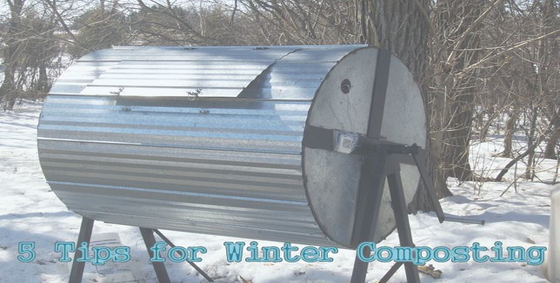
Keep it warm and insulated.
You can purchase insulated tumblers for winter composting that will help keep the cold air out so the bacteria can stay active. If you don’t want to spend money for a tumbler, there are still ways to achieve this. If you have a bin that can be moved, move it just inside a garbage can to help shield it from the brisk air. If you cannot move it, think of ways that you can protect it. This is a very important factor to consider when starting your compost. If you have a compost pile that that is not contained in a bin or structure, consider covering it with a tarp, or building a structure to protect it. You can make a simple structure out of scrap wood, bricks or anything that will keep the cool wind out. Worried about snow? Don’t be! Snow can actually help insulate from the dip in temperatures.
Keep it active.
Be sure to keep the bacteria growing by continuously adding to your compost. This does not have to be only organic material. In the fall, rake up some leaves to add over the duration of the winter. Adding a little bit every time you turn your compost and aerate it can help keep things active. You will also need to be sure you are balancing out what bacteria it needs to thrive on a good mix of brown and green material. Brown material is anything that produces carbon (ie. leaves). Green material is anything that produces nitrogen (i.e. kitchen scraps).
Small is better.
When adding new compost material, be sure to keep the material small. The cold weather will slow down your composting, so crunch the leaves you add to make smaller particles, and when your adding new kitchen scraps be sure to chop them finer as well.
Less is more.
Don’t turn over your pile as frequently; tumbling your bin can actually add cold air into your compost that will damage the frail system inside. When the weather is warm you can go back to turning the material with every addition.
Keep it Moist.
Be sure to keep your compost moist, but do not overwater. The dry winter air can leave your compost struggling to hold moisture, but only add the water in small quantities and do not do it when the weather is extremely frigid. It can cause the moisture inside to freeze and put an end to your composting process.
Do you have any other tips for winter composting? Be sure to share them in the comments below!






Leave a Reply